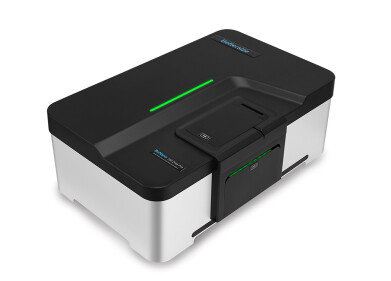-
 DrySyn SnowStorm Reactor.
DrySyn SnowStorm Reactor. -
 DrySyn SnowStorm Reactor with External Thermostatic Chiller & Heater/Stirrer.
DrySyn SnowStorm Reactor with External Thermostatic Chiller & Heater/Stirrer.
Laboratory Products
Sub Ambient Synthesis of Novel Gold Organometallic Complexes
Sep 17 2020
Asynt reports upon the synthesis of novel Gold (Au) organometallic complexes for use by researchers in the School of Chemistry at the University of Bristol achieved using a DrySyn SnowStorm Reactor and DrySyn Splitter Manifold.
The aim of the research being undertaken at the University of Bristol was to create new Au(I) organometallic complexes for use in gold-mediated cross-coupling reactions. Subsequent transmetallation with an organozinc reagent and reductive elimination led to the formation of products with new C-C bonds.
Researchers at the University of Bristol invested in a DrySyn SnowStorm Reactor fitted with DrySyn vial inserts to give them the capability of performing up to 12 low temperature reactions in parallel at a reliable and consistent temperature. By connecting the SnowStorm Reactor to a DrySyn Splitter Manifold the group were also able to utilise the recirculating chiller with other equipment in the lab, maximising their use of resources.
Mr Jamie Cadge, a PhD researcher in the Russell Group at the University of Bristol School of Chemistry commented: "Synthesis of gold complexes and performing multiple gold-mediated cross-coupling reactions is challenging chemistry. We found that certain steps required stable, low temperatures to be successful. Making use of three vial inserts in the SnowStorm Reactor meant that we could perform multiple reactions at the same time. Consequently, we are able to screen varying conditions for these cross-couplings with different substrates. The recirculating chiller unit and manifold supplied with the DrySyn SnowStorm has also allowed us to improve the environmental impact of our lab we as are no longer reliant on the use of multiple condensers which use tap water or dry ice-cold fingers.” Mr Cadge added: "I would recommend the DrySyn SnowStorm Reactor to other researchers as it enables multiple reactions to be reliably performed at consistent low temperatures in parallel."
The DrySyn SnowStorm Reactor from Asynt offers an attractive solution for scientists looking to undertake low-temperature chemical reactions and studies (-30 to +150°C). Unlike traditional reaction cooling methods, accurate and prolonged temperature control on a DrySyn SnowStorm is regulated by an external thermostatic circulator. The use of such a temperature control system not only eliminates the risk of temperature fluctuations due to perishable coolants but can also improve your labs sustainable use of resources.
Digital Edition
ILM 49.5 July
July 2024
Chromatography Articles - Understanding PFAS: Analysis and Implications Mass Spectrometry & Spectroscopy Articles - MS detection of Alzheimer’s blood-based biomarkers LIMS - Essent...
View all digital editions
Events
ACS National Meeting - Fall 2024
Aug 18 2024 Denver, CO, USA
Aug 25 2024 Copenhagen, Denmark
Aug 28 2024 Phnom Penh, Cambodia
Sep 04 2024 Chiba, Tokyo, Japan
Sep 04 2024 University of Warwick, Coventry, UK




24_06.jpg)












